Relief Official Comes With Vote of Confidence
The Coast Guard vice admiral selected Friday to lead the government’s response to the havoc created by Hurricane Katrina is known as a decisive manager who makes the most of limited resources.
Serving in New England in the early 1990s, then-Capt. Thad W. Allen was nicknamed “the Schwarzkopf of Connecticut” by members of his staff who saw similarities between the way he handled an oil spill in sensitive Long Island Sound and Gen. H. Norman Schwarzkopf, who led U.S. forces in the 1991 Persian Gulf War.
“He doesn’t let red tape and bureaucracy get in his way -- he figures out a way to do things,” said Master Chief Petty Officer Skip Bowen, who has served with Allen three times in the last 15 years, and is stationed in the Florida Keys.
Allen, 56 and now a vice admiral, commanded the Coast Guard’s Eastern Seaboard and Gulf region on Sept. 11, 2001, when every port was considered a potential terrorist target and even the most innocuous foreign merchant ship had to be viewed as possibly sinister.
Already juggling missions ranging from drug interdiction to environmental enforcement, the Coast Guard suddenly found itself charged with making sure ports and shipping were safe from attack.
“We’re an organizational chameleon,” Allen said in an interview for a Coast Guard oral history of the Sept. 11 terrorist attacks. “We can be whatever color anybody wants us to be for the mission at hand.”
For his efforts, Allen was promoted to chief of staff, third in the Coast Guard’s chain of command.
Like the Federal Emergency Management Agency, the Coast Guard is part of the Department of Homeland Security. But it has retained an autonomy that enabled it to swing into action in Katrina’s wake and immediately send helicopters to pluck survivors from rooftops in flooded New Orleans.
Allen on Friday replaced FEMA director Michael D. Brown, who has become a lightning rod for criticism, as ‘principal federal officer’ on the disaster scene. Brown was called back to Washington. Allen had been serving as Brown’s deputy in New Orleans in the last few days. He will be working with Gen. Russel L. Honore, the commander of Army troops in New Orleans.
Allen met with his staff Friday and scheduled a lunch for today with elected officials from the New Orleans area. At a news conference, he set an ambitious goal: to return to a semblance of normalcy.
“Quite frankly, one of our goals now needs to be to reconstitute communities and community capabilities to get on with life,” Allen said. “We need to start talking about the reconstitution of services and how we can assist in doing that.”
Allen’s appointment is not the first time the Bush administration has turned to a Coast Guard officer to salvage a troubled operation. Retired Commandant James M. Loy was drafted to rescue the foundering Transportation Security Administration in 2002, and went on to become deputy secretary for Homeland Security.
The Coast Guard’s ability to handle many missions simultaneously makes it an asset for political leaders trying to manage a crisis. Putting a career military officer in charge of the Katrina response also may help to defuse criticism of the administration for entrusting the task to a political appointee with little crisis management experience.
Allen’s career has included overseeing drug and migrant programs in Miami, stints aboard three Coast Guard cutters, and a tour of duty in Thailand during the Vietnam War.
The son of a retired Coast Guard chief petty officer who served in World War II, Allen was born in Los Angeles while his father Clyde was stationed in Long Beach. As a young man, he decided to follow after his father’s vocation.
“He found that the Coast Guard was really his niche, and he really went after everything and tried to do a good job,” said Clyde Allen.
Thad Allen graduated from the Coast Guard Academy in 1971. He also holds master’s degrees in public administration and science, from the George Washington University and MIT, respectively. He is married, with three grown children.
“He called and said he’d been ordered to New Orleans, and that he would be in touch,” his father said. “We haven’t heard from him since.”
More to Read
Start your day right
Sign up for Essential California for news, features and recommendations from the L.A. Times and beyond in your inbox six days a week.
You may occasionally receive promotional content from the Los Angeles Times.






